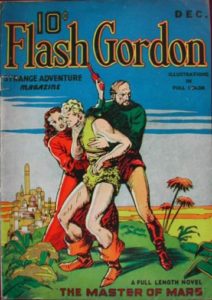Salvation: Sexual Stereotypes in Sappy Summer SciFi Series
I was so looking forward to the third season of Wayward Pines, which DNA Science covered in the summers of 2015 and 2016, but alas it was not to be. I’ll have to wait another year to learn how the mutant Abbies came to be cradling a human newborn at the end of season 2, and the fate of the main characters sent back into the deep freeze, like leftover pizza.
Instead, we have Salvation, an actual network TV show (on CBS). An errant asteroid is hurtling towards Earth and it will devastate humanity in a mere 186 days, initiating a period of dread among those in the know not unlike how many of us felt after November 8, 2016.
It’s a rather tired idea, but I’m hanging in there at least until we learn the selection criteria for the lucky survivors. So here’s a synopsis, followed by a look at the “The End of the World As We Know It” genre.
Basically, three factors can end humanity:
2. Viruses
3. Our assaults on the environment
The genetics connection: the disaster kills many and thereby causes a severe population bottleneck. When humanity manages to resurge, gene variant frequencies have changed, altering the course of microevolution.
SALVATION
An MIT astrophysics graduate student, Liam Cole, whilst working with pretty holograms of the solar system, discovers an asteroid headed towards Earth. He learns this while in bed with a girl he picked up at a TED-like talk by charismatic tech wizard Darius Tanz, when his phone buzzes an alert much like I get for a flash flood warning. The phone screen shows data, and a few numbers are red.
“I got a hit!” Liam yells, and is off to see his professor, Malcolm Croft, who confirms Liam’s conclusion. Liam jumps on his bike and is pursued through the streets of Cambridge by a mysterious black car, with gratuitous chase scene music pulsing. The good professor then misses class. Has he been offed by an unseen bad guy, or kidnapped?
Scene change to the Pentagon, where Press Secretary Grace Barrows, who cries a lot because that’s what women journalists do and who is sleeping with Deputy Defense Secretary Harris Edwards (who I keep mixing up with actor Ed Harris from Apollo 13; coincidence?). There’s also a disgruntled local reporter. Of course.
Turns out the government folk have known about the asteroid that Liam discovered for 3 months – this is a fictional administration a little more in tune with science than the current one. And the Pentagon has a plan, but their experimental “gravity tractor” blows up on launch. A lackey who mistakenly sees this on his screen is whacked by an unseen bad guy.
Meanwhile, intrepid grad student Liam finds himself in an elevator at a fancy hotel, where he’s hiding from the bad guys chasing him, and runs into, coincidentally, tech wizard Tanz. Announcees Liam, “An asteroid is going to collide with the Earth in 186 days and we’re all gonna die!”

Once out of the elevator, Liam whips out a flash drive with his solar system hologram, sticks it into a laptop, and then he and Tanz utter profundities like “the sky is falling” and “planet killer.” “Extinction level event” is bandied about because that’s what you say when these things happen. The asteroid, or the meteors it might splinter into, are headed for the east coast.
But wait! Tanz has a plan! He explains it to Barrows, possibly in an attempt to woo her away from Edwards, because sexual tension is necessary whenever a man and a woman work together.
“An ark! To save the human race from extinction!” he proclaims, obviously never having read Seven Eves (see below). And here’s where the genetics comes in.
Darius Tanz is going to select the “minimum viable population” of “166 well chosen souls to save the species.” I’m reminded of my own grad school days when I had to put a minimal number of flies into a tube for the culture to take off.
“Whaddya mean, you’re gonna take your 166 besties and fly to Mars?” Barrows chimes in.
Tanz is already funding “reusable interplanetary vehicles” to ferry his friends up to the ark. He shows Barrows tantalizing 3D pictures. Tanz wants to save the 166 that science dictates can jumpstart the species, whereas Barrows, being a woman and a parent and therefore ruled by emotion, wants to save everyone.
Tanz asks Barrows to spy on the government effort, as Liam overhears. Tension!
Liam races back to Boston to have sex with sci-fi writer Jillian again, before the planet blows up. He poses a deep hypothesis to her: “If the world was going to end, should a man work to save thousands, or spend the rest of his time with a beautiful woman?” Pouty, teary, Jillian pauses, then says of course save the thousands! Because that’s what women do. We save everyone.
As the episode ends, Grace Barrows is watching her kid give a graduation speech and of course she’s crying. The unknowing grad utters all sorts of unknowingly relevant platitudes, such as “it’s up to us to solve the problems of the future.” Ha!
Grace then makes a whiny speech to the ever-regal Darius Tanz, beginning with “Screw you and your ark. You’re right, the government plan won’t work,” and then she begs the mogul to save the world, because, once again, that’s what we XXs do. Beg men to save us. In the last scene, Liam’s back, having satisfied his sexual urges for the moment, and joins Tanz and Barrows.
Returning to selecting the future gene pool, how will the 166 be chosen? Looks? Profession? Fertility? Ties to Russia? We’ll have to wait to find out. But in the meantime, here are some variations on this well-worn theme.
NEAR-EARTH OBJECTS
In many end-of-the-world scenarios, “near-earth objects” cause havoc. These include:
• An asteroid: a big rock orbiting the sun, aka a minor planet.
• A comet: a big rock plus ice. An asteroid or comet breaking apart can beget
• a meteoroid, which may range in size from that of a dust speck to slightly smaller than an asteroid. A meteoroid hurtling to Earth becomes
• a meteor, and anything that doesn’t burn up and clunk someone on the head (I know someone to whom this happened) is
• a meteorite.
So, in size order:
 PLANET The 1933 science fiction novel When Worlds Collide, by Philip Wylie and Edwin Balmer, inspired Flash Gordon, Superman, and a 1951 film. A few humans, selected for superior intelligence, board a spaceship to escape an earth suddenly in the path of an oncoming planet, to found a human colony elsewhere. Two planets are actually careening into Earth, Bronson alpha on a path of destruction, but Bronson beta, which seems habitable, coming just close enough for a lucky few to hop aboard. How to select the survivors? When Worlds Collide dramatizes the founder effect and eugenics.
PLANET The 1933 science fiction novel When Worlds Collide, by Philip Wylie and Edwin Balmer, inspired Flash Gordon, Superman, and a 1951 film. A few humans, selected for superior intelligence, board a spaceship to escape an earth suddenly in the path of an oncoming planet, to found a human colony elsewhere. Two planets are actually careening into Earth, Bronson alpha on a path of destruction, but Bronson beta, which seems habitable, coming just close enough for a lucky few to hop aboard. How to select the survivors? When Worlds Collide dramatizes the founder effect and eugenics.
EXPLODING MOON The 2015 novel (and eventual film) Seven Eves, by Neal Stephenson, opens with an astonishing “The moon blew up without warning and for no apparent reason.”
After the moon shatters into seven pieces, Earth’s residents have two years to prepare for the chunks to smash into the surface and make the planet uninhabitable for centuries. Some people already living on huge space stations survive, and others are selected to join them, based on how useful they’ll be. Lots of engineers.
Everyone left behind perishes under the fiery barrage of moon junk, while above, on the “Cloud Ark,” a series of space stations tethered to an asteroid, the human species dwindles. Eventually it resurges from just seven surviving women, with help from assisted reproductive technologies to make babies – no XYs needed. Five thousand years after the moon blows up, the human population, ready to inhabit a healed earth, has resurged to 3 billion.
COMET In the 1998 film Deep Impact, 200,000 people are preselected, based on their utility, to ride out a comet crash in limestone caves in Missouri. An additional 800,000 are chosen by lottery to join them.
ASTEROID The 1997 film Asteroid was so forgettable that my husband named it Hemorrhoid. A comet disrupts the orbits of asteroids Helios and Eros, causing a chunk of Eros to crash into Dallas.
WE RUIN THE EARTH It won’t necessarily take a heavenly body crashing into Earth to kill us off. We may do it to ourselves.
 Although a freak string of weirdly extreme weather events triggers the global cooling of The Day After Tomorrow, we are clearly responsible for the ruined environment that causes humanity to fracture into the aberrant Abbies and the cryopreserved selected humans of Wayward Pines. Chosen for their utility in the eerily isolated town, the selected survivors were supposed to wake up in 4028, but emerged earlier, a little like Woody Allen’s Miles Monroe character in the deep freeze of Sleeper.
Although a freak string of weirdly extreme weather events triggers the global cooling of The Day After Tomorrow, we are clearly responsible for the ruined environment that causes humanity to fracture into the aberrant Abbies and the cryopreserved selected humans of Wayward Pines. Chosen for their utility in the eerily isolated town, the selected survivors were supposed to wake up in 4028, but emerged earlier, a little like Woody Allen’s Miles Monroe character in the deep freeze of Sleeper.
Perhaps nuclear war will do us in. In the classic Twilight Zone episode “Third from the Sun,” to beat the nuke, a pair of scientists working on a spaceship and their families have 48 hours to pack up and steal the ship to head for a planet 11 million miles away. The trick ending: they’re headed for Earth.
In Justin Cronin’s novel The Passage, evil researchers infect a dozen death-row inmates with experimental viruses that turn them into vampires. The infected “virals” escape and ravage the Earth, killing 90 percent of humanity and turning most of the survivors into vampires. A century later, the resurged human population has lost much of its genetic diversity in the bottleneck that amplifies the genomes of the handful of survivors, like the women aboard the Cloud Ark. It’s a Founder effect, minus the influence of neighboring genomes. The Passage is a TV series that I thought I’d missed, but it’s slated for 2018.
THE ORANGE MENACE Here’s a plot unspooling right now. A narcissistic entrepreneur and former reality-TV show host, with a limited vocabulary, propensity to contradict himself and tell untruths, and who suffers uncontrollable Twitter tantrums, inexplicably is elected President of the United States and now has access to the nuclear codes.
If I sent that idea to my agent I’m sure she’d reject it as too far-fetched. Some days, jumping aboard an ark to escape disaster doesn’t sound so bad …


